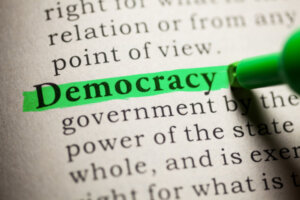Democracy in Action

On Saturday afternoon, sitting in a volunteer training to be a non-partisan observer for the U.S. November Elections, I began taking notes to manage my tendency towards distraction. I'm a passionate believer that voting is a privilege, and I always try to volunteer to honor that privilege. It's not always exciting, but it's important to validate the legitimacy of elections.
So on one level, this blog is a reminder to vote!
But it’s also a chance to share my insights that are relevant to you as a parent of complex kids, no matter where you live in the world -- in particular when it comes to fostering independence!
Because there are some ways that being a parent of complex kids is a lot like non-partisan election observing. (Yes, I see linkages to the coach approach everywhere!)
Here's what I learned that might be applicable to you when fostering independence:
1. Watching democracy in action is a lot like watching paint dry. Sometimes it's excruciating how slow it goes and how hard it is to just observe and do nothing. This is so true for parenting, too.
- Allowing kids to learn from their experiences and from their mistakes can be exhausting, frustrating, and even scary.
- Take a marathon view - you're in this for the long haul. Change happens over time and does not have to be immediately corrected.
2. Take a systems approach.
- Pay holistic attention to the process.
- Look for what works & what doesn't.
- Don't start with a solution. Recommendations come after fully assessing a situation or problem with a process.
3. Foster independence.
- Treat people the way you want to be treated.
- When people have any kind of disability, allow them to be as independent as possible.
- Don't render assistance without asking first if they want assistance.
- Let them know what supports are available to them, but never assume people with disabilities need you to do anything for them.
- Offer support if they want them without forcing it on them.
4. When there's any violence or danger, get out and get yourself safe.
- Self-care is fundamental to effective parenting.
5. Best practice doesn't always happen.
- Mistakes happen.
- People don't always follow every rule or process.
- Just because you know what people "should be doing" to be most effective doesn't mean they're going to do it.
Non-partisan election monitoring is a fascinating (and sometimes frustrating) process. As Jason Carter, Chair of the Board of the Carter Center said to us,
"This is a higher calling. The question is not about who is going to win but, rather, will the results be respected. The results are not as important as the credibility of the process. We need to … advocate for the system … It's not about this election, it's about all of them… For you to be credible, you have to focus on the process - not a particular solution, but make sure the system persists."
That is a great reminder for us as parents! When parenting complex kids, it's important to focus on the process more than the outcome. It's not about a single test, paper, quiz, or towel on the floor. It's about all of them. To foster independence, it's essential to focus on being in a continuous process of problem-solving rather than being attached to individual outcomes.
The Carter Center is a Human Rights and Health Care organization that believes in the power of individual people.
And so does ImpactParents. 
Here's to using privilege responsibly,
Elaine
P. S. I was surprised to learn that, in the state of Georgia and some other states, non-partisan voting observation is actually illegal! While I'll admit this blows me away a bit, I'm grateful that the Carter Center has begun to selectively introduce non-partisan observing into the US electoral process. I've been honored to witness the integrity of this authentic, non-partisan process. If you're eligible to vote, wherever you are in the world, I invite you to honor the sacredness of that privilege.

